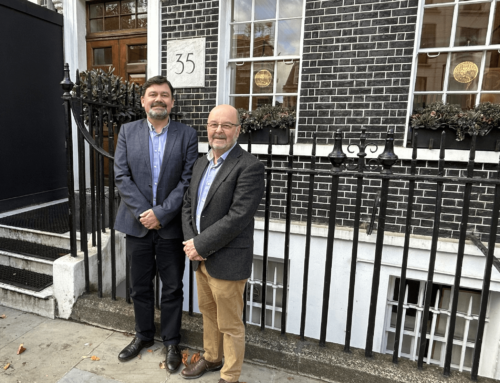As part of our ongoing support for Shelter Cymru, our Charity of the Year, we are delighted to feature a Q&A with Jennie Bibbings, Head of Campaigns at the charity.
We wanted to find out more about Jennie’s role at Shelter Cymru and the fantastic work that the charity does…
Can you tell us about your charity, Shelter Cymru?
We are an independent Welsh housing and homelessness charity and we exist to defend the right to a safe home. We help around 17,000 people a year from all over Wales, offering free, confidential and independent advice. My job is to understand the reasons that are driving all those people to have to use our services, and then to change the system by campaigning to improve laws, policies and practices so that people don’t have to use our services in future. Like any charity worth its salt, we are working to put ourselves out of business one day!
How long have you worked at Shelter Cymru?
I’ve been here for more than 11 years now. I started as Policy Manager in 2011 and worked my way up. Before I came here I was a consumer rights campaigner and before that I was a newspaper journalist on the Wales On Sunday, but that feels like a long time ago now!
What help and support does Shelter Cymru offer?
The main way in which we help is by giving people advice on their housing rights. We help people from all walks of life and in all kinds of situations, including people who are street homeless as well as people living in insecure or poor quality housing. More than a third of the people we help are private tenants who experience a wide range of problems including disrepair, harassment, unaffordable rents, and eviction at short notice for no reason. Currently we’re also working with a lot of people who are homeless and living in temporary accommodation around Wales such as B&Bs, hostels and hotels. It’s heartbreaking to see children having to live in such unpleasant conditions. We do our best to help families manage the stress of life in temporary accommodation, and we help them to fight their corner so they can move more quickly into a long-term home that meet their needs.
What is your day-to-day role like?
It’s really varied and absorbing. I am lucky to work with a fantastic team of fellow campaigners and we fire each other up with enthusiasm to get out there and change things for the better. A typical day will include planning for our latest campaign, meeting with caseworkers to hear about the issues our clients are experiencing, and meeting with politicians and officials to educate them about the causes of homelessness and ask them to support our calls.
What are the most challenging parts of your job?
The most challenging thing is deciding what we prioritise to campaign on. So many problems come up in our casework but our resources are really tight and we don’t have the budget to employ enough staff to campaign on everything that needs changing. I find it frustrating when we can’t do everything! But we do our best to work with partner organisations, so that when there’s an issue that we can’t prioritise, we know that others are taking it forward.
What are the most rewarding parts of your job?
Undoubtedly the most rewarding thing is seeing positive impacts from our campaigning work. When you have worked on a successful campaign and you know it’s going to make life a little bit better for people, there’s no feeling like it. In recent years our campaigning has led to letting fees being banned, and we campaigned to reduce evictions from social housing which led to a 40 per cent reduction in eviction actions over the course of a year. We’ve also worked closely with the Welsh Government to make the homelessness system fairer. This Senedd term the Welsh Government is going to ban priority need, which is a really destructive aspect of homelessness legislation that we’ve campaigned against for years. It’s exciting to see things change for the better, even if change can be so painfully slow at times.
How has working for Shelter Cymru changed you?
Working for Shelter Cymru has opened my eyes to a whole field of human experience that I wasn’t aware of in my privileged life. Before I worked here I didn’t realise how easy it is to become homeless and how difficult it is to get out of homelessness once you are in it. It’s not quite as simple as saying that ‘anyone is only a few pay packets from homelessness’, because some people have much more resources and family support to draw on than others do. But if you have ill health for example then you are more vulnerable to losing your home, and once you’re homeless you can stay that way for a very long time, moving between different hostels and forms of temporary accommodation and never getting the stable home that you need. Working for Shelter Cymru has made me much more aware of the reality of the poverty trap.
Tell us some of your personal achievements…
I feel proud of my team, who I have done my best to support and develop over the years, and I feel proud of the impact we’ve had on Welsh housing and homelessness legislation. I’m also proud of the work I did before I came to Shelter Cymru, when I campaigned alongside families whose children had been harmed in an e.coli outbreak in Welsh schools, which was caused by a negligent butcher. We worked together to change the law to ensure the same thing can’t happen again. I’ll never forget how it felt to work alongside mothers who showed incredible strength and bravery standing up for their children.
What are the common misconceptions around homelessness?
When you mention the word ‘homelessness’ many people think of rough sleeping, but the truth is that rough sleeping is only part of the picture. Every year in Wales thousands of people become homeless. Out of those thousands a few hundred will be living on the streets and the rest will be ‘hidden’ homeless – sleeping on friends’ sofas; living in temporary accommodation; or else living in homes that are in very poor condition or unsuitable for their needs.
On top of that, many thousands of people every year come within days of losing their home and are only able to avoid homelessness thanks to the hard work of council homelessness services and other agencies such as Shelter Cymru.
What are your hopes and aspirations for Shelter Cymru in the next 5 years?

How can people support Shelter Cymru?
There are lots of ways people can lend support.
You can sign up as a campaign supporter on our website and we’ll let you know via email when there are actions you can take such as signing petitions and writing to your Senedd Members.
You can become a regular giver with a small monthly donation, or you can fundraise for us – whether you join an activity or organise your own, there are lots of opportunities to get involved. Every penny is spent in Wales and helps to ensure our vital work can continue.
Mooneerams Solicitors would like to extend their thanks to Jennie at Shelter Cymru for taking part in this Q&A.
Find out more about our Charity of the Year here.









